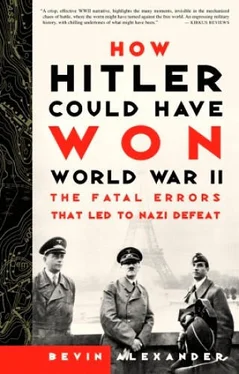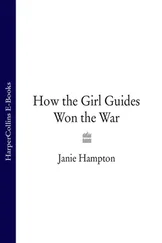He ordered the army to prepare for an invasion of Greece through Bulgaria. By the third week of February 1941 the Germans had massed 680,000 troops in Romania. Bulgarian leaders, excited by Hitler’s promise to give them Greek territory and access to the Aegean Sea, allowed passage of German troops through the country. On February 28, German units crossed the Danube and took up positions to assault Greece.
The first of 53,000 British troops, mostly motorized forces from Australia and New Zealand, landed in Greece on March 7 and moved forward to help their new Greek allies. Off Cape Matapan south of Greece on March 28, the British fleet destroyed three Italian cruisers in a night battle, thereby ensuring that Mussolini’s battle fleet never dared challenge the Royal Navy again.
The Yugoslavs meanwhile had been under intense pressure to join the Axis. But the Yugoslav people, especially the Serbs, were violently opposed. The Yugoslav premier and foreign minister slipped out of Belgrade by night to avoid hostile demonstrations and signed the Tripartite Pact in the presence of Hitler and Foreign Minister Joachim von Ribbentrop in Vienna on March 25.

The next night in Belgrade, a popular uprising led by air force officers under General Dusan Simovic overthrew the government and the regent, Prince Paul, who had agreed to join the Axis. They packed Prince Paul off to Greece. Prince Paul had intended to kidnap Prince Peter, the eighteen-year-old heir to the throne, but Peter escaped down a drainpipe, and the rebels at once declared him king.
The coup threw Hitler into a wild rage. He ordered an immediate attack on Yugoslavia from all quarters.
At dawn on April 6, 1941, German armies of overwhelming strength fell on Yugoslavia and Greece. Maximilian von Weichs’s 2nd Army in Austria and Hungary rushed into Yugoslavia from the north and east.
Wilhelm List’s 12th Army in Bulgaria had the crucial task. While its 30th Corps pressed to the Aegean against no opposition near European Turkey, parts of the 18th Mountain Corps smashed against the Metaxas Line, but bounded back in repulse. This was Greece’s main defense in the northeast, held by six divisions.
Meanwhile the motorized 40th Corps under Georg Stumme and Panzer Group 1, five divisions under Ewald von Kleist, drove westward into southern Yugoslavia and split the Yugoslavs from the Greeks. Kleist’s panzers turned north, captured Nish, and raced down the Morava River valley toward Belgrade, meeting Georg Hans Reinhardt’s 41st Panzer Corps pressing on the capital from Romania.
The Yugoslav army in theory had thirty-five divisions. But it was poorly armed, and Yugoslavia was about to rip apart into its separate ethnic groups. Only about half the reservists, mostly Serbs, had answered the call to mobilize. The remainder, largely Croats and Slovenians, had remained at home.
The army command tried to concentrate its scattered Serbian troops around Sarajevo, but the German 41st Panzer Corps cut through Bosnia and forced about 300,000 men to surrender. Simovic and young King Peter flew out, first to Greece, later to Palestine.
Meanwhile, the German 40th Corps pressed into the Vardar River valley, seized Skopje in southern Yugoslavia, then turned through the Monastir Gap into Greece, about seventy-five miles west of Saloniki.
At the same time, parts of the 18th Mountain Corps slipped around Lake Dojran, twelve miles west of the point where the Greek, Yugoslav, and Bulgarian borders joined. Thereby flanking the Metaxas Line, they drove down the Vardar (Axios) valley to the Aegean and seized Saloniki. This isolated the Greeks on the Metaxas Line, and forced them to surrender.
The British expected the Germans to advance directly southward from Saloniki past Mount Olympus and along the Aegean. This is where they placed most of their troops. Instead, the Germans thrust southwestward from the Monastir Gap toward the west coast of Greece, cut off the Greeks in Albania, and turned the western flank of the British. This produced the quick collapse of resistance.
General Wavell, with agreement of London, ordered the expeditionary corps to evacuate. British warships and transports ran into harbors around Athens and the Peloponnisos, to which the British and some Greeks were hurrying, and began taking out troops, leaving most of their weapons behind. The Royal Navy evacuated 51,000 men by the end of April. Around 13,000 British were killed or forced to surrender.
As King George II of Greece, his family, and high officials flew out on British flying boats, German panzers rolled into Athens on April 27 and hoisted the swastika over the Acropolis. Most of the Greek army capitulated.
It had taken the Germans only three weeks to overrun Yugoslavia and Greece and drive the British once more off the Continent. Field Marshal List’s 12th Army alone had captured, in addition to the British, 90,000 Yugoslavs and 270,000 Greeks, at a cost of barely 5,000 killed and wounded.
6 ATTACKING THE WRONG ISLAND

ADOLF HITLER NOW MADE A DECISION THAT FLEW IN THE FACE OF LOGIC, DISREGARDED the actual military situation in the Mediterranean, and revealed his inability to see a different way to pursue the war than by attacking the Soviet Union.
He decided to use his highly trained parachute and glider troops to seize the relatively unimportant island of Crete in the eastern Mediterranean, but he refused to capture Malta, which lay directly on the seaway between Italy and Libya.
This absurd choice—made over the objections of Admiral Raeder, the navy high command, and elements in the OKW—marked Hitler’s final rejection of a Mediterranean strategy that could have brought him victory. If a campaign to conquer North Africa was going to be waged by the Axis, it was imperative to secure Malta. If, on the other hand, Hitler was sending troops to Libya merely to mollify Mussolini, with no large strategic aim, then German brains, men, and equipment were being wasted in a foolish and reckless manner.
Crete, home of the ancient Minoan civilization, is a large Greek island (3,200 square miles) 180 miles south of Athens, and some 250 miles north of Egypt and eastern Libya, or Cyrenaica. It is 152 miles long, but only 8 to 35 miles wide.
Once the Balkans had been seized by the Germans, Crete strategically fell into a twilight zone. For the British, long-range bombers based on Crete could reach the Ploesti oil fields in Romania, 675 miles north, but RAF bases on the island could be blasted by German aircraft a hundred miles away in southern Greece. For the Germans, occupation made no more sense, because aircraft based there would be farther from Cairo and Alexandria than planes in eastern Cyrenaica.
The situation was entirely different in regard to Malta. This small British-ruled island group (122 square miles), only 60 miles south of Sicily and 200 miles north of Tripoli, was a dagger sticking into Italian and German backs in North Africa. Here the British had based airplanes, submarines, and warships with the explicit purpose of interdicting traffic to Libya.
The danger of Malta was emphasized to everyone when the British sank a transport meant for Rommel’s Africa Corps on the night of April 15–16, 1941. British threats from Malta soon made nearly every passage to Libya a throw of the dice. Sometimes the ship got through, sometimes it didn’t. Sunken Italian and German cargo vessels began to litter the seabed of the Sicilian Narrows between the two continents.
Читать дальше




![Джонатан Димблби - Barbarossa - How Hitler Lost the War [calibre]](/books/385421/dzhonatan-dimblbi-barbarossa-how-hitler-lost-the-w-thumb.webp)









